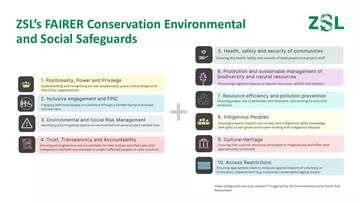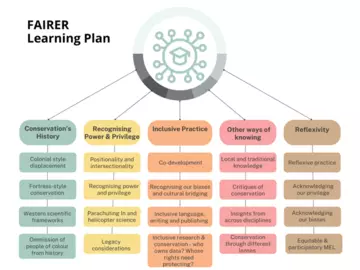
At ZSL, we believe that conservation should be just and inclusive.
We're committed to taking a rights-based approach to conservation delivery, protecting both people and wildlife.
Our FAIRER conservation framework, a system designed to ensure that our projects and programs have a positive impact on both the environment and the communities we work with, is a step towards achieving this goal.
What is FAIRER?
The fair, accountable, inclusive, respectful, ethical and reflective (FAIRER) conservation frameworkis a new iteration or alternative model of traditional environmental and social management system (ESMS). It's a system designed to ensure that our projects and programs have a positive impact on both the environment and the communities we work with.
Unlike traditional ESMS systems, FAIRER aims to move beyond traditional risk mitigation and instead prioritise justice and inclusion, focusing on:
- Fairness: Treating everyone equitably.
- Accountability: Taking responsibility for our actions.
- Inclusivity: Listening to and involving diverse voices.
- Respect: Valuing different cultures and perspectives.
- Ethics: Acting with integrity and honesty.
- Reflection: Continuously learning and improving.
It is about reconsidering the approaches we value, reflecting on past histories within the spaces we operate, and recognising diverse values that may differ from ‘Western’ scientific thinking. By adopting this framework, we aim to create a more sustainable and equitable future for both people and wildlife.
Why FAIRER is needed
The global conservation sector is undergoing a significant shift. While there's a growing recognition of the need for socially just and equitable conservation practices, translating these ideals into tangible actions remains a challenge.
The traditional approach of ESMS, often rooted in Western scientific paradigms, focuses on risk mitigation and aiming to avoid harm. However, this approach falls short of addressing the deeper systemic issues that perpetuate inequality and injustice that lead to unintended negative consequences and has hindered long-term conservation success.
To address these issues, we have committed to a rights-based approach that prioritises both people and the planet. FAIRER aims to bridge this gap so we can move beyond simply avoiding doing harm to actively promoting positive change.
ZSLs FAIRER Framework
ZSL’s FAIRER Conservation Framework aims to better deliver equitable conservation impact, whilst safeguarding the local communities, people, and places with which we work. The framework goes beyond risk mitigation to embed justice, equity and inclusion through a decolonial lens.
The framework consists of three pillars:
1. Environmental and Social Safeguards;
2. A FAIRER learning plan taking a decolonial lens;
3. Policies and position statements.
The FAIRER Conservation Framework aims creates a space for critical reflection, learning, co-design and analyses of power and privilege.
We want to introduce time to understand the history and legacy of conservation and enable a move from a risk mitigation framework towards prioritising justice and inclusion within conservation.
Pillar 1: Environmental and Social Safeguards.
The FAIRER Framework starts with a set of 10 safeguards to be followed when designing, planning and implementing projects. These are harmonised with internationally recognised and accepted good practice standards for environmental and social sustainability, but aim to go further by laying the foundations for inclusive and reflexive conservation and promoting best practice. Standards 1 to 7 should be followed across all landscapes and projects, whereas standards 8 to 10 are only applicable when triggered by the environmental and social risk assessment and will not apply to all projects or programmes.

Pillar 2: FAIRER Learning Plan
To instil reflexivity, introspection and cross-cultural learning, the FAIRER learning plan aims to introduce learning and knowledge sharing across five themes:
- Conservation’s history
- Power and privilege
- Inclusive practices
- Other ways of knowing
- Reflexivity.
The FAIRER learning plan supports learning and identification of values needed to help embed fairer and more equitable approaches across our conservation activities.

Pillar 3: FAIRER policies
ZSL’s policies will feed into the FAIRER Conservation Framework but also provide stand-alone guidance and outline ZSL’s position on specific topics. These are still in development but will include institutional policies for:
- Free Prior Informed Consent
- Gender Equity and Social Inclusion
- Human Rights
We create positive change for wildlife and people by inspiring and empowering everyone from children to politicians to notice, care, and act for nature.